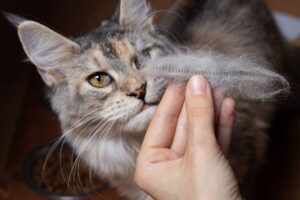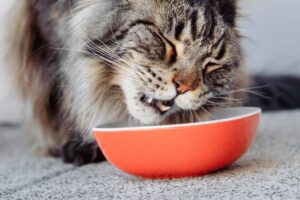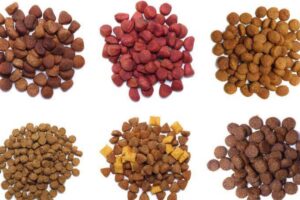Can Cats eat Weetabix? (Possible Dangers)
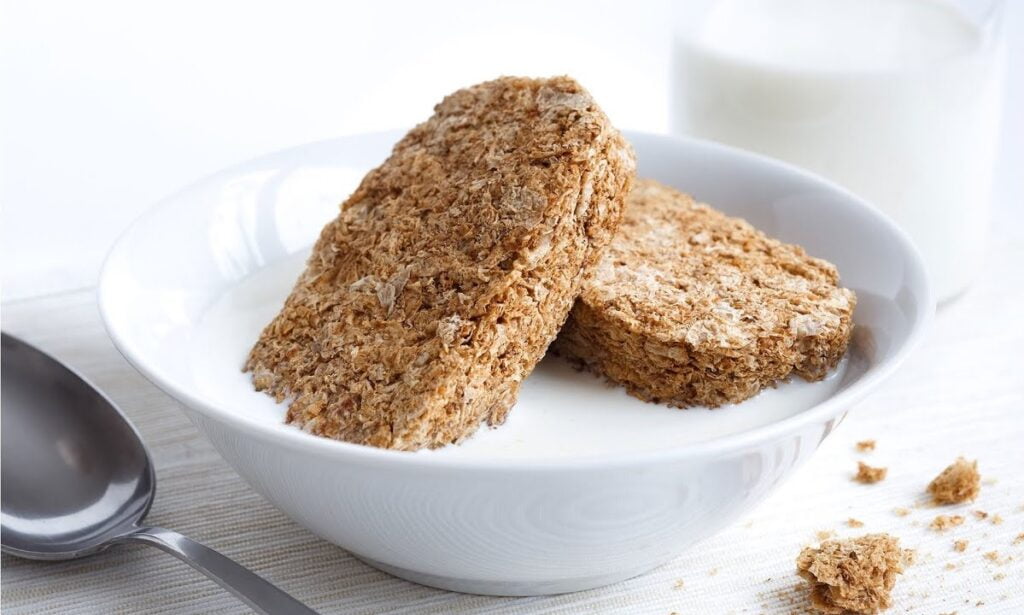
Many cat owners may wonder whether it is safe to share their breakfast cereals, such as Weetabix, with their feline companions. As responsible pet owners, it’s important to understand the potential dangers and benefits associated with feeding Weetabix to cats. This article takes a neutral stance and aims to provide detailed information to help you make an informed decision in deciding “can cats eat Weetabix?”
Weetabix Composition
Weetabix is a popular breakfast cereal made primarily from whole grain wheat. Each Weetabix biscuit typically contains whole wheat, malted barley extract, sugar, salt, and various fortified vitamins and minerals. Some variations may include additional ingredients such as dried fruits or flavorings.
Whole grain wheat forms the base of Weetabix, providing a significant portion of its composition. It is rich in complex carbohydrates and dietary fiber. The fiber content in Weetabix is known to contribute to digestive health and may help regulate bowel movements.

The added sugar and salt in Weetabix are relatively low, as it is not primarily marketed as a sweet cereal. However, it is worth noting that even in small amounts, excessive sugar intake can be harmful to cats. Additionally, some cats may have underlying health conditions, such as kidney issues, that require strict dietary control, making it important to be cautious about any added sugars or salts in their diet.
The fortified vitamins and minerals in Weetabix are intended to enhance its nutritional value. While these additives can provide some additional nutrients, it’s essential to remember that cats have specific dietary requirements that are best met through a balanced, meat-based diet.
Cats as Carnivores
Cats are obligate carnivores, which means their bodies have evolved to thrive on a diet primarily consisting of animal-based proteins. Their nutritional needs are met through nutrients such as taurine, arachidonic acid, and specific vitamins and minerals that are naturally present in animal tissues.
Unlike omnivores or herbivores, cats have specific physiological adaptations that enable them to digest, absorb, and metabolize nutrients from animal sources more efficiently. Their digestive systems are optimized for the breakdown of proteins and fats, while they lack certain digestive enzymes necessary for efficient carbohydrate metabolism.
Carbohydrates, including those found in Weetabix, are not natural or essential components of a cat’s diet. Cats do not have a nutritional requirement for carbohydrates, and excessive consumption can lead to health issues. A diet high in carbohydrates can cause imbalances, including weight gain, obesity, diabetes, and digestive problems.
Weetabix as a Treat
While Weetabix is not an ideal dietary choice for cats, it can be safely consumed in small quantities as an occasional treat. Offering a few bites or a small crumbled piece of Weetabix can provide a crunchy texture that some cats enjoy.
It’s important to emphasize that Weetabix should never replace a balanced and species-appropriate diet. Cats have specific nutritional needs that are best fulfilled through a diet rich in high-quality animal proteins. For reference, cats need about 30 – 40% of protein, and between 10 – 20% of fat to stay healthy. Weetabix can only be a minor addition to their regular meals.
When using Weetabix as a treat, moderation is crucial. It should not comprise a significant portion of a cat’s calorie intake. Controlling the portion size is essential to prevent overconsumption and potential health risks associated with excessive carbohydrate intake.
Potential Dangers
Feeding Weetabix to cats should be approached with caution due to the potential dangers associated with its consumption. The high carbohydrate content in Weetabix can be problematic for cats, as their digestive systems are not adapted to handle large amounts of carbohydrates.
Cats lack the necessary enzymes, such as amylase, to efficiently break down and metabolize carbohydrates. Excessive carbohydrate consumption can lead to weight gain, obesity, and an increased risk of developing conditions such as diabetes. Kittens especially, will have a harder time digesting Weetabix as compared to adults, so extra caution should be taken.
Additionally, the high fiber content in Weetabix can have mixed effects on feline health. While a moderate amount of fiber is beneficial for maintaining digestive health, excessive fiber intake can lead to gastrointestinal upset. Cats may experience diarrhea, bloating, or discomfort if they consume too much fiber, potentially causing disruptions in their digestive system.
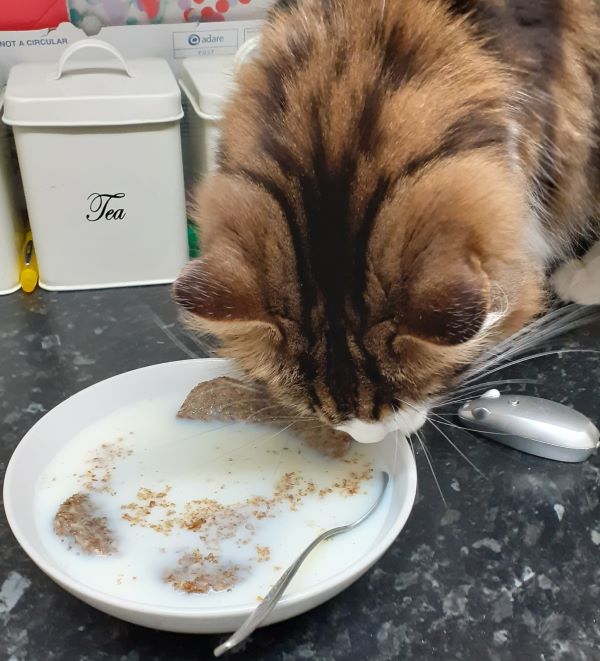
Another common issue is when Cat owners attempt to feed their cats Weetabix with milk. This is not a good option, as commercial milk is usually not suitable for cats, and can cause vomiting and diarrhea. As cats grow older, many also become lactose intolerant, and thus is not advisable to feed them milk.
It is important to closely monitor your cat after feeding them Weetabix as a treat. Observe their behavior, litter box habits, and stool consistency for any changes. If you notice any adverse effects, such as prolonged gastrointestinal upset or discomfort, it is advisable to discontinue offering Weetabix and consult with your veterinarian.
Individual Sensitivities and Allergies
Just like humans, cats can have individual sensitivities or allergies to certain ingredients in Weetabix. While the primary ingredients in Weetabix are generally safe for cats, it is possible for some cats to exhibit adverse reactions to specific components.
Allergic reactions in cats can vary in their severity and manifestations. Some cats may develop skin irritations, itching, or hives, while others may experience gastrointestinal symptoms such as vomiting or diarrhea. If you suspect that your cat is having an allergic reaction to Weetabix, it is important to discontinue its consumption and consult with a veterinarian.
A veterinarian can help identify the specific ingredient causing the allergic reaction and provide appropriate guidance. They may recommend an elimination diet or allergy testing to determine if there are any underlying sensitivities that need to be addressed. It is always better to err on the side of caution when it comes to the health and well-being of your furry companion.
Conclusion
So, can Cats eat Weetabix? Yes.
However, here are other better alternatives to Weetabix that are more appropriate for a cat’s diet. You can even explore homemade options as well which are more affordable, convenient, and nutritious for your cat.
For example, instead of offering Weetabix, you can provide your cat with small pieces of cooked, unseasoned chicken or turkey as a treat. These lean meats are rich in animal-based proteins that align with your cat’s dietary needs. Additionally, there are commercially available cat treats specifically formulated to meet a cat’s nutritional requirements.
In conclusion, Weetabix can be considered safe for cats in small quantities as an occasional treat. However, it is important to recognize that Weetabix is not a natural or essential part of a cat’s diet. Cats are obligate carnivores, and their bodies are best suited to derive nutrients from animal-based protein sources.
